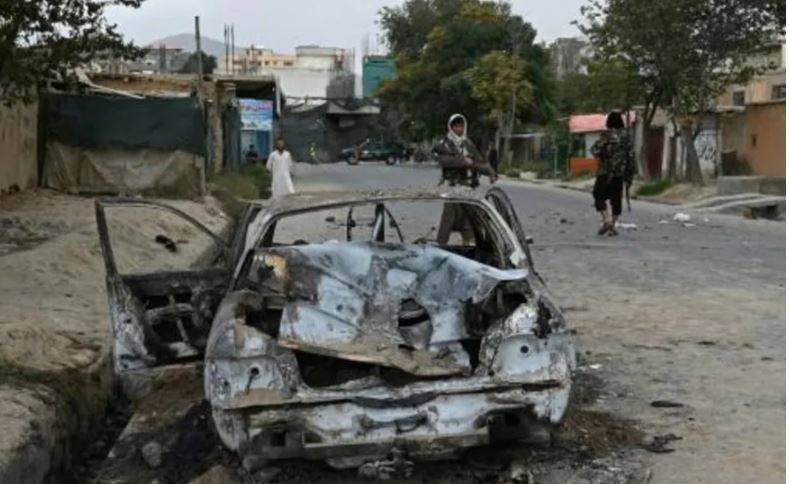Rockets were launched on Monday towards Kabul Airport, where US forces are racing against time to complete their withdrawal from Afghanistan and evacuate their allies amid the likelihood of new attacks by the Islamic State group. US President Joe Biden has set a deadline of Tuesday for the removal of all American troops from Afghanistan, effectively ending the longest war the United States has fought, which began in response to the September 11, 2001 attacks.
The Taliban's return to power, after being ousted by a US-led international coalition in 2001, has triggered a massive influx of Afghan nationals to Kabul Airport in the hope of boarding flights as part of the US-led evacuation efforts, fearing retribution from the extremist group. These flights, which have allowed more than 120,000 people to be evacuated through Kabul Airport, are set to end officially on Tuesday with the last departure of US forces. However, the US military is currently focused on withdrawing soldiers and American diplomats in particular.
The Islamic State, a rival to the Taliban, poses the greatest threat to the withdrawal following a suicide bombing near the airport last week that killed more than a hundred people, including 13 US servicemen. Biden warned that further attacks are highly likely, while the United States confirmed on Sunday that it had conducted a drone strike in Kabul on a vehicle linked to the Islamic State. This was followed by the launch of rockets toward the airport on Monday morning.
The White House confirmed the rocket attack on the airport early Monday but emphasized that evacuation operations "are ongoing." Press Secretary Jen Psaki stated, "President Biden has been informed that operations are continuing uninterrupted at Hamid Karzai International Airport in Kabul and reiterated his instructions to officials to double efforts to do everything necessary to protect our forces on the ground."
A photographer from the AFP agency captured images on Monday of a destroyed vehicle with a rocket launcher still visible in the back seat. An American aircraft struck the vehicle two kilometers from the airport. A Taliban official in the area suggested that five rockets were fired but that airport air defenses intercepted and destroyed them. No reports of injuries or damages at the airport were issued, although the incident heightened concerns among residents still reeling from years of war. Abdullah, who lives near the airport, told AFP, "Since the Americans took over the airport, we can't sleep properly. We either hear gunfire or rocket blasts or alarm sirens or the immense noise of aircraft engines. And now they are under direct attack, which could endanger our lives."
The US stated that the airstrike on Sunday against the car bomb eliminated a new threat from the Islamic State. However, the strike may have caused civilian casualties. Central Command spokesman Bill Urban said, "We are aware of reports of civilian casualties following the strike (we conducted) on the vehicle in Kabul today (Sunday)." He added, "We are still evaluating the results of this strike, which we know disrupted an imminent threat from the Islamic State-Khorasan against Kabul Airport." He continued, "We would feel deep sorrow over any potential loss of innocent lives." In recent years, the Islamic State has carried out some of the deadliest attacks in Afghanistan and Pakistan, particularly targeting mosques, schools, public parks, and even hospitals. The suicide bombing last week near Kabul Airport resulted in the highest number of US military casualties in a single day since 2011.
The threat from the Islamic State has prompted the US military and the Taliban to cooperate to ensure the airport's security, a prospect that seemed unimaginable just a few weeks ago. On Saturday, Taliban fighters escorted Afghan citizens who had disembarked from buses to the main passenger terminal for handover to US forces for evacuation.
The Taliban, which took control of Afghanistan in mid-August by overthrowing the Western-backed government, has asserted that it will rule differently from its previous governance between 1996 and 2001, during which girls and women were barred from education and work. However, many Afghans fear the imposition of the group’s hardline approach and potential retribution against those who assisted foreign forces and Western missions or the previous US-backed government.
On Sunday, the Taliban announced that its supreme leader, Hibatullah Akhundzada, who has never appeared publicly, is in southern Afghanistan. Taliban spokesman Zabihullah Mujahid stated, "He is in Kandahar. He has been residing here from the beginning," while deputy spokesman Bilal Karimi mentioned that he "will appear publicly soon."




